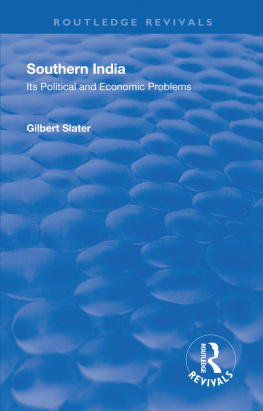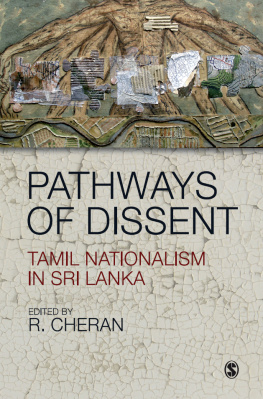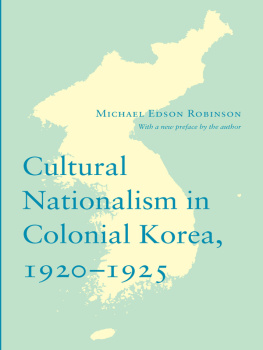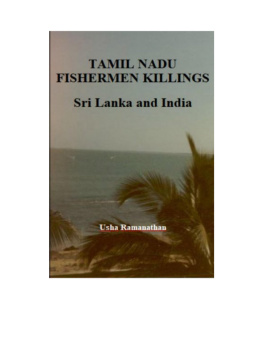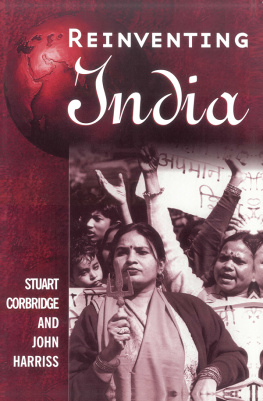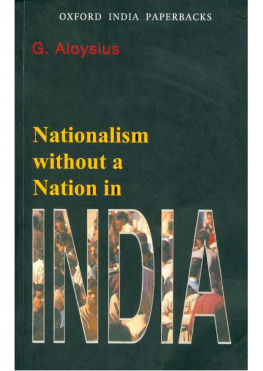PATHWAYS TO NATIONALISM
Pathways to Nationalism
Social Transformation and Nationalist Consciousness in Colonial Tamil Nadu, 1858-1918
S. Ganeshram
First published 2017
by Routledge
2 Park Square, Milton Park, Abingdon, Oxon OX14 4RN
and by Routledge
711 Third Avenue, New York, NY 10017
Routledge is an imprint of the Taylor & Francis Group, an informa business
2017 S. Ganeshram and Manohar Publishers & Distributors
The right of S. Ganeshram to be identified as author of this work has been asserted by him in accordance with sections 77 and 78 of the Copyright, Designs and Patents Act 1988.
All rights reserved. No part of this book may be reprinted or reproduced or utilised in any form or by any electronic, mechanical, or other means, now known or hereafter invented, including photocopying and recording, or in any information storage or retrieval system, without permission in writing from the publishers.
Trademark notice : Product or corporate names may be trademarks or registered trademarks, and are used only for identification and explanation without intent to infringe.
Print edition not for sale in South Asia (India, Sri Lanka, Nepal, Bangladesh, Afghanistan, Pakistan or Bhutan)
British Library Cataloguing in Publication Data
A catalogue record for this book is available from the British Library
Library of Congress Cataloging in Publication Data
Catalog record for this book has been requested
ISBN: 978-1-138-23486-4 (hbk)
ISBN: 978-1-315-27677-9 (etk)
Typeset in Garamond
by Kohli Print, Delhi 110 051
Contents
This book is an attempt to examine the role of socio-economic factors in the rise and development of nationalism in the Tamil-speaking region of Madras Presidency during the period 1858 to 1918. It analyses both the socio-economic conditions and the growth of nationalism in Tamil Nadu besides their mutual relationship by applying both historical methods of documentary analysis and a sociological perspective. The post-Mutiny ambience helped Indian Nationalism to take roots in various pockets of India. The socio-economic factors facilitated its growth into a ripening stage. A study of this base period could be a launch pad to understand the growth of Indian Nationalism in all its ramifications. In this venture, I have been fortunate to be associated with a good number of scholars and friends who helped me in bringing out this volume in its present form.
First and foremost, I would like to convey my sincere thanks and gratitude to my esteemed teacher Prof. L.S. Vishwanath for all his encouragement and guidance. He has shown sincere interest and scrutinized several drafts from which this book finally emerged. I am deeply indebted to him for all his kind help. Prof. S. Arul-krishnamoorthy, former Professor and Head, Department of English, G.V.N College, Kovilpatti, with his exemplary knowledge of English language, has placed me in his debt by going through the draft of this book meticulously and making extremely good suggestions. I remain obliged to him for all his help.
I express my sincere and special thanks to my beloved teacher Prof. B.S. Chandrababu for his intellectual encouragement and interaction. I am deeply indebted to Prof. G. Sethuraman for his moral support. My gratitude also goes to my friend Prof A.R.Venkata-chalapathy for his unflagging love and support throughout my academic life.
I am deeply obliged to Profs. Bipan Chandra, Kuldeep Mathur and M.S.S. Pandian of Jawaharlal Nehru University, Dr Guna-sekaran of University of Delhi, Prof. K. Cbinnappan and Dr L Sengaiah of S.R. Naidu College, Dr Sundararajan and Govindarajan of Tamil Nadu State Archives for their moral and intellectual support.
I place on record my sincere thanks to my friends Uthayasuriyan, Subramanian, Ganesan, Ezhilarasi, Gowri, Swapna, Thangappan and Abbas for their help and encouragement.
My special thanks are due to the staff of Tamil Nadu State Archives, Madras Institute of Development Studies, Adyar Library and Research Centre, Madras University Library, Cannemara Library, Maraimalai Adigal Library, Madras, National Archives of India, Nehru Memorial Museum & Library and Jawaharlal Nehru University Library, New Delhi for granting access to records, journals and books in their possession.
I thank Mr. Balasubramanian for his computing assistance. I also profusely thank Shri Ramesh Jain and his dedicated staff for bringing out this book within a short period of time.
S. GANESHRAM
- BP Board's Proceedings
- BRP Board of Revenue Proceedings
- CID Crime Investigation Department
- EPW Economic and Political Weekly
- ESHR Economic and Social History Review
- GO Government Orders
- INC Indian National Congress
- MMS Madras Mahajana Sabha
- MNA Madras Native Association
- MNNPR Madras Native News Paper Reports
- NAI National Archives of India
- TNA Tamil Nadu Archives
- USSF Under Secretary's (Secret) Safe File
Nationalism is a modern phenomenon which, as a concept and as a principle, emerged gradually in western Europe. Though it was theoretically formulated in revolutionary France,
Nationalism continues to be a subject of scholarly controversy John Plamentaz views nationalism as primarily a 'cultural phenomenon', which according to him often takes a 'political form'. He also classifies nationalism into two types:'Western' and 'Eastern'. For him,'Western' nationalism emerged primarily in western Europe and the 'Eastern nationalism is to be found in eastern Europe, in Asia and Africa and also in Latin America. Thus, the character of nationalism differs from country to country
Individual studies on various countries, as advocated by Bassam Tibi, alone can help in the general understanding of the phenomenon of nationalism. and others. All these studies show that the nature and character of nationalism differs from country to country.
Further, 'Third World' nationalism cannot be discussed in terms of categories taken from European history. John H. Kautsky argues that nationalism in colonial countries was apparently not based on nationality as in the case of Europe. He defines nationalism in colonial countries as a form of anti-colonialism, but 'anti-colonialism must here be understood as opposition not merely to colonialism narrowly defined, but also to a colonial economic status'. He further says, 'colonial' nationalism was not only aimed at the decolonization but also on modernization through industrialization. Kautsky and the modernization theorists believe that the Western-educated colonial elite were the carriers of ideas of nationalism who successfully made the national integration of diverse ethnic, cultural and linguistic groups.
Indian nationalism, viewed in this light, is also a modern phenomenon which as an ideological factor played an important role in the process of emancipation from colonial rule. It was a by-product of colonialism in the sense that Indian society and economy experienced a comprehensive process of transformation under colonial rule. The local economic structure began to change as a result of infiltration of the British power in India. The British pushed India into a subordinate colonial position and into the orbit of world capitalist economy. The 'colonial exploitation' In Tamil Nadu, as in other parts of India, these social and economic factors provided impetus to the growth of nationalist consciousness. This work is an attempt to examine the role of socio-economic factors in the rise and development of nationalism in the Tamil-speaking region of Madras Presidency during the period 1858-1918, an analysis of pre-Gandhian trends in the growth of nationalism.


